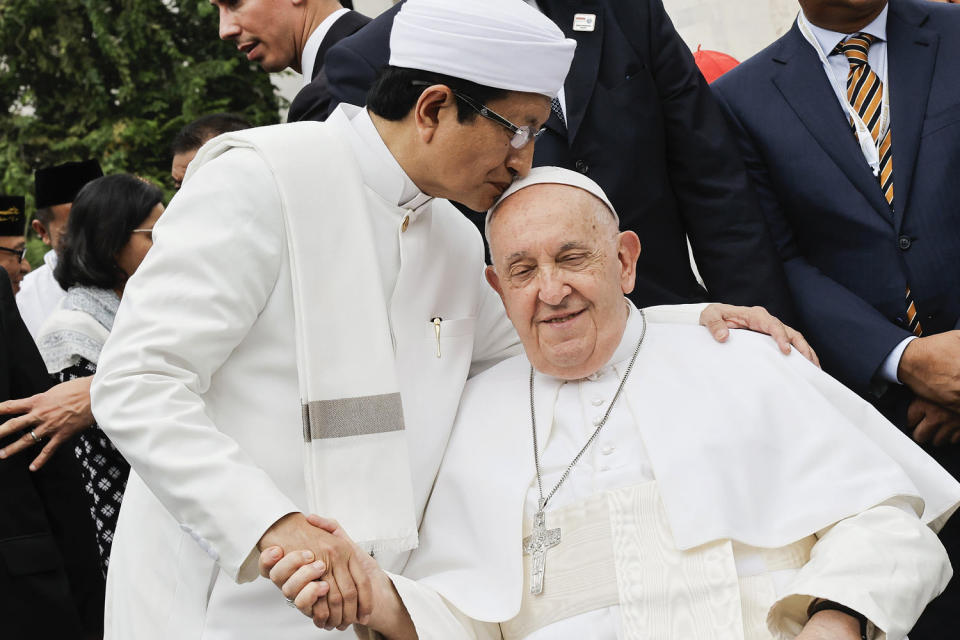Pope Francis and the grand imam of Southeast Asia’s largest mosque vowed to unite against religiously motivated violence and called for “decisive” climate action in a joint declaration Thursday during a visit by Francis to Indonesia.
In a religiously symbolic gesture, the interfaith agreement was signed in the Indonesian capital of Jakarta at the Istiqlal Mosque, which was designed by a Christian architect.
The declaration signed by Francis and Grand Imam Nasaruddin Umar said it was “particularly worrying” that religion was being used to justify violence and cause suffering, especially to women, children and older people. It urged “interreligious dialogue to be recognized as an effective instrument for resolving local, regional and international conflict.”
It also called for action on the “ongoing environmental crisis,” which it said “has become an obstacle to the harmonious coexistence of peoples.”
The interfaith gathering, a highlight of Francis’ 12-day trip to Asia and Oceania, was attended by representatives of Indonesia’s six officially recognized religions: Islam, Buddhism, Confucianism, Hinduism, Catholicism and Protestantism.
Before signing the declaration, the two religious leaders visited the “Tunnel of Friendship,” a 90-foot underpass that connects the mosque compound with Jakarta’s main Catholic cathedral, Our Lady of the Assumption.
The tunnel is considered a sign of tolerance in Indonesia, the world’s largest Muslim-majority country, where religious freedom is constitutionally protected but there have been deadly instances of violence against Christians and other religious minorities.
“We who belong to different religious traditions have a role to play in helping everyone pass through the tunnels of life with our eyes turned towards the light,” Francis said.
He warned the gathering that religion can be misused to justify wars, when it should be about “promoting and safeguarding the dignity of every human life.”
Umar, the grand imam, said the mosque regularly hosts interfaith activities and that “it is not only a house of worship for Muslims, but also a great home for humanity.”
At the end of the gathering, he leaned to kiss Francis on the head. Francis then took Umar’s hand, brought it to his face and kissed it as well.
Interfaith dialogue has been a closely held cause for Francis, 87, who became the first pope to visit Indonesia in 35 years when he arrived on Tuesday. He will also visit Papua New Guinea, East Timor and Singapore during the trip, which was postponed from 2020 due to the Covid-19 pandemic.
Francis, who now regularly uses a wheelchair due to a knee problem, will travel over 20,000 miles during the journey, the longest and farthest of his pontificate. The Vatican said he would be traveling with a doctor and two nurses as is standard procedure.


About 80,000 people were expected to attend a Mass celebrated by Francis Thursday afternoon at a stadium in Jakarta. There are about 8 million Catholics in Indonesia, a nation of 280 million people where almost 87% of the population is Muslim.
Despite Indonesia’s professed commitment to religious freedom, religious discrimination and violence are not uncommon in the archipelago nation.
In 2021, a newlywed couple blew themselves up outside a packed cathedral during Palm Sunday Mass, wounding 20 people in the city of Makassar.
In 2018, a family of six, including a 9-year-old girl, carried out suicide bombings against three Christian churches during Sunday services in the country’s second-largest city of Surabaya. The attacks, for which the Islamic State claimed responsibility, killed at least 13 people and injured 40.
Lai Pan Chiu, director of the Center for Catholic Studies at the Chinese University of Hong Kong, said Francis’ emphasis on the common roots of modern Catholicism and Islam was helpful for improving interfaith relations.
“However, in order to address the past violence, no matter whether it is Muslims against Christians or vice versa, an even more helpful approach is to dig deeper into the Abrahamic tradition of showing hospitality to strangers, including those of other religions,” he said in an email.
After Indonesia, Francis will travel to the Pacific island nation of Papua New Guinea on Friday and meet with local religious leaders the following day. Then he will leave for East Timor, the only Catholic-majority country on his itinerary.
Francis’ last destination is Singapore, where three-quarters of the population is ethnically Chinese and he will have the chance to send an indirect message to Catholics in China as the Vatican tries to improve relations with Beijing.
This article was originally published on NBCNews.com







